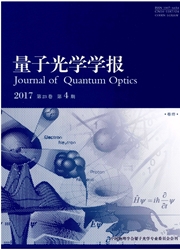

 中文摘要:
中文摘要:
Grover搜索是一种量子搜索方法,利用了量子叠加态的性质,通过一些操作的反复作用,而使目标态的几率幅变大,非目标态的几率幅变小,从而以较大的概率找到目标。与经典搜索方法相比,能够较快地从一个数据库中找到目标元。这是一种搜索到目标的全部信息的方法,但是在有些情况下,我们并不需要知道目标的全部信息,而只需要知道目标的部分信息,因而只需要找到含有目标的一部分数据库中的元素,这就是部分搜索。Grover和Radhakrishnan提出了一种部分搜索方法,称为Grover—Radhakrishnan Algorithm of Partial Search(GRK),所考虑的数据库只含有一个目标。在我们的文章中,我们研究了在含有多目标的数据库,且目标被随机分配在两块中时,GRK所需要的查询次数会有怎么样的变化。得到查询次数s和所分块数K、目标数t的关系。并且与平均分配的情况进行比较。
 英文摘要:
英文摘要:
By quantum Grover search algorithm, people can find a target item in a database faster than any classical algorithm. In this search algorithm the initial state is the equally weighted superposition of all basis states, which is operated by the unitary operator repeatedly. Consequently, non-target states transfer their amplitude to the target state, so we can find the target item with larger probability. However, sometimes we just want to know partial information, so we only need to find the subdatabase ( a block) containing the target item, which is partial search. A partial search algorithm was suggested by Grover and Radhakrishnan, which is denoted as Grover-Radhakrishnan Algorithm of Partial Search (GRK), in which they considered the database contains one target item. In our paper, we study the database which contains several target items, and they are randomly distributed in two target blocks. Our algorithm is based on GRK. We minimize the number of queries to the oracle for blocks of large size, and compare this case with the one that each target block contains the same number of target items.
 同期刊论文项目
同期刊论文项目
 同项目期刊论文
同项目期刊论文
 期刊信息
期刊信息
